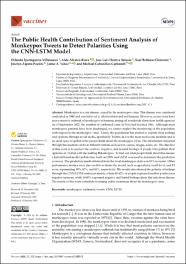Mostrar el registro sencillo del ítem
“The Public Health Contribution of Sentiment Analysis of Monkeypox Tweets to Detect Polarities Using the CNN-LSTM Model“
| dc.contributor.author | Iparraguirre-Villanueva, Orlando | |
| dc.contributor.author | Alvarez-Risco, Aldo | |
| dc.contributor.author | Herrera Salazar, Jose Luis | |
| dc.contributor.author | Beltozar-Clemente, Saul | |
| dc.contributor.author | Zapata-Paulini, Joselyn | |
| dc.contributor.author | Yáñez, Jaime A. | |
| dc.contributor.author | Cabanillas-Carbonell, Michael | |
| dc.date.accessioned | 2023-05-26T17:05:16Z | |
| dc.date.available | 2023-05-26T17:05:16Z | |
| dc.date.issued | 2023-01-31 | |
| dc.identifier.uri | https://hdl.handle.net/20.500.13053/8626 | |
| dc.description.abstract | “Monkeypox is a rare disease caused by the monkeypox virus. This disease was considered eradicated in 1980 and was believed to affect rodents and not humans. However, recent years have seen a massive outbreak of monkeypox in humans, setting off worldwide alerts from health agencies. As of September 2022, the number of confirmed cases in Peru had reached 1964. Although most monkeypox patients have been discharged, we cannot neglect the monitoring of the population with respect to the monkeypox virus. Lately, the population has started to express their feelings and opinions through social media, specifically Twitter, as it is the most used social medium and is an ideal space to gather what people think about the monkeypox virus. The information imparted through this medium can be in different formats, such as text, videos, images, audio, etc. The objective of this work is to analyze the positive, negative, and neutral feelings of people who publish their opinions on Twitter with the hashtag #Monkeypox. To find out what people think about this disease, a hybrid-based model architecture built on CNN and LSTM was used to determine the prediction accuracy. The prediction result obtained from the total monkeypox data was 83% accurate. Other performance metrics were also used to evaluate the model, such as specificity, recall level, and F1 score, representing 99%, 85%, and 88%, respectively. The results also showed the polarity of feelings through the CNN-LSTM confusion matrix, where 45.42% of people expressed neither positive nor negative opinions, while 19.45% expressed negative and fearful feelings about this infectious disease. The results of this work contribute to raising public awareness about the monkeypox virus. “ | es_PE |
| dc.format | application/pdf | es_PE |
| dc.language.iso | eng | es_PE |
| dc.publisher | MDPI | es_PE |
| dc.rights | info:eu-repo/semantics/openAccess | es_PE |
| dc.rights.uri | https://creativecommons.org/licenses/by/4.0/ | es_PE |
| dc.subject | monkeypox; sentiment; tweets; CNN; LSTM | es_PE |
| dc.title | “The Public Health Contribution of Sentiment Analysis of Monkeypox Tweets to Detect Polarities Using the CNN-LSTM Model“ | es_PE |
| dc.type | info:eu-repo/semantics/article | es_PE |
| dc.identifier.doi | https://doi.org/10.3390/vaccines11020312 | |
| dc.type.version | info:eu-repo/semantics/publishedVersion | es_PE |
| dc.publisher.country | UK | es_PE |
| dc.subject.ocde | 3.00.00 -- Ciencias médicas, Ciencias de la salud | es_PE |
Ficheros en el ítem
Este ítem aparece en la(s) siguiente(s) colección(es)
-
Web of Science (WOS) [236]


